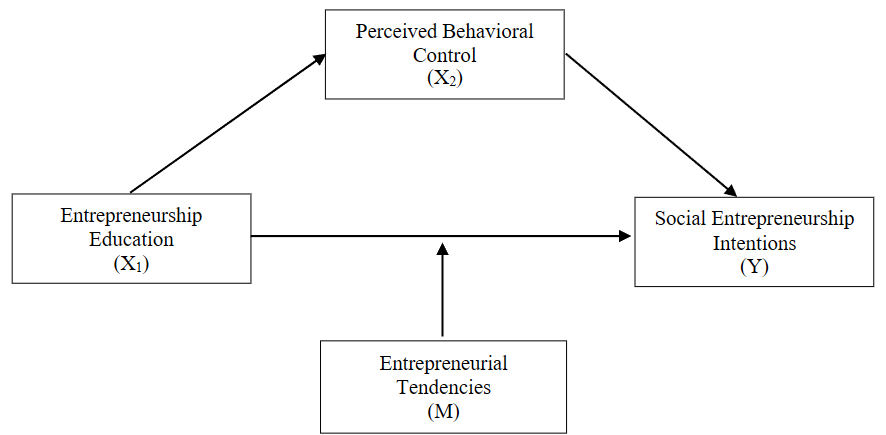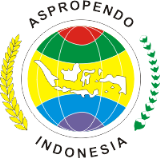Entrepreneurship Education and Perceived Behavioral Control Toward Social Entrepreneurship Intention University Student in Indonesia
DOI:
https://doi.org/10.23917/jpis.v33i2.3230Keywords:
Social entrepreneurial intentions, perceived behavioral control, entrepreneurship education, entrepreneurial tendencies.Abstract
The research aims to examine how entrepreneurship education and perceived behavioral control affect social entrepreneurial intentions. It also investigates whether entrepreneurial tendencies can moderate the relationship between the two variables in Accounting Education students throughout Indonesia. The theory used to determine the intention of social entrepreneurship is the Theory of Planned Behavior (TPB). According to TPB, the intention to perform a behavior can be examined from attitudes, subjective norms, and perceived behavioral control. This research is expected to contribute to increasing entrepreneurial intention, especially in the field of social entrepreneurship. This research used a quantitative methodological approach with a survey research method in the form of distributing questionnaires to a sample of 372 respondents. The results indicated that both entrepreneurship education and perceived behavioral control significantly influence social entrepreneurship intention. However, it was observed that entrepreneurial tendency does not moderate the relationship between entrepreneurship education and social entrepreneurship intention. It is recommended to improve the quality of entrepreneurship education programs by integrating a curriculum that is relevant to students need and developing the skills needed for entrepreneurship. This will encourage the development of an entrepreneurial mindset and creativity through entrepreneurship education programs.
Downloads
INTRODUCTION
Based on current data in Indonesia, the low entrepreneurial intention among vocational high school graduates and the minimal number of jobs available nowadays have contributed to a rise in unemployment. This increase is not only due to the imbalance between job availability and the labor force but is also influenced by factors such as overcrowding, insufficient individual skills, and a societal orientation still predominantly focused on the formal sector which caused decreased competitiveness and a low level of education. Based on data from the Central Statistics Agency (BPS), the Open Unemployment Rate (TPT) was 6.26 percent in February 2021 and increased to 6.49 percent in August 2022 (BPS, 2021). In February 2022, it was 5.83 percent, and by August 2022, it slightly rose to 5.86 percent. The Open Unemployment Rate further decreased to 5.45 percent in February 2023 (Central Bureau of Statistics (BPS), 2023).
In overcoming unemployment, universities are expected to create jobs or foster entrepreneurship independently, rather than solely focusing on job placement (Kardila & Puspitowati, 2022; Yeodyra & Handoyo, 2022). A growing number of individuals with an entrepreneurial spirit will contribute to the emergence of many entrepreneurs, consequently generating numerous job opportunities. This abundance of jobs provides people with the flexibility to choose roles aligning with their interests and respective skills (Kusmintarti et al., 2017).
The entrepreneurial process is an effort to create something different by identifying and evaluating opportunities, various financial, psychological, and social risks and resources needed for the formation of new companies (Anas, 2019). The development of entrepreneurs is in line with advances in information technology that change the way humans view environmental changes, especially in economic growth that is not in line with the welfare of society. The poverty and welfare gap is a never-ending issue. Many people try to carry out various social activities to minimize the gap. Social actions that arise on the basis of social concerns to solve the problems of poverty, environmental damage due to pollution and waste caused by business impacts. As a form of this social concern, there are efforts made by various actions to provide social benefits to the community (Anas, 2019).
Social entrepreneurship was introduced in the 1970s to address social issues in a sustainable manner. Social entrepreneurship is an interesting topic that has the potential to have a positive impact on society and the environment. Social entrepreneurship is a form of combining the concept of entrepreneurship which prioritizes economic activities but the goals to be achieved are not only profit, but also social goals (Anas, 2019). Social entrepreneurship is a form of profit-seeking business, which is a more socially responsible profit. Meanwhile, social entrepreneurship is the innovative use of resources to create social value with the aim of meeting social needs (Seyoum et al., 2021).
Entrepreneurship education can influence social entrepreneurship intentions. Entrepreneurship education has a positive influence on social entrepreneurship intention. Currently, entrepreneurship education is one of the important studies for college students. Therefore, entrepreneurship education can be considered as an important factor in increasing social entrepreneurship intention. By improving entrepreneurial knowledge and skills, individuals can be better prepared to start social ventures that can have a positive impact on society.
With entrepreneurship education, this can increase students' entrepreneurial intention. The important things in creating student businesses are the student entrepreneurs themselves, educators, and supporting actors in the ecosystem (Longva, 2021). Entrepreneurship education is unique not only in its subject matter, but also in its pedagogical approach, making it an important and innovative examination technique for many people, such as the use of simulations, interdisciplinarity, educational models, and the use of structured practices in learning (Lili, 2011).
Colleges and universities have an important role in fostering entrepreneurial awareness, quality, and capacity of student entrepreneurship (Wiyanto, 2015a). In this case, universities in developing entrepreneurship on campus can be done by providing academic support to become facilitators in motivating, directing and providing infrastructure in preparing graduates who have strong motivation, courage, ability and supporting character in establishing new businesses (Wiyanto, 2015).
Entrepreneurship education and perceived behavioral control on social entrepreneurship intention in Indonesia is an important topic to study. Some of research results indicate that entrepreneurship education can impact students' entrepreneurial interest (Naveed et al., 2021). Recognized as a vital tool, entrepreneurship education not only enhances knowledge about creating a new business but also boosts individual entrepreneurial capacity related to opportunity recognition and self-confidence (Lopez et al., 2021). Thus, entrepreneurship education can benefit students in developing soft skills or entrepreneurial character, cultivates a new generation of highly educated entrepreneurs with a mindset for creating jobs, while also strengthening the relationship between the academic and business worlds, particularly with SMEs (Paray & Kumar, 2020). Entrepreneurship education is important in the first stage of the entrepreneurial process, such as the development of entrepreneurial intentions (Paray & Kumar, 2020). Entrepreneurship education is at the top of the political agenda, and has become a top priority in countries around the world (Galvão et al., 2018). Therefore, research on the effect of entrepreneurship education on entrepreneurial intentions is important. In addition, factors such as attitude, autonomy, authority, self-realization, confidence, security assurance, academic support, and social support also affect student entrepreneurial intention (Wiyanto, 2015); (Jadmiko, 2021); (Nurhayati et al., 2019).
Ajzen (1991) defines intention as an indication of how hard people are willing to try and how much effort they plan to put into a particular behavior (Galvão et al., 2018). The stronger a person's intention to perform a certain behavior, the more likely the behavior will be executed effectively (Galvão et al., 2018). Entrepreneurial intentions play an important role in explaining why individuals establish new businesses. Entrepreneurial intention can be defined as an individual's awareness and determination to establish a new business venture (Ahmed et al., 2021).
The purpose of this research is to determine the influence of entrepreneurship education and behavioral control on social entrepreneurial intentions in Indonesia and explore how entrepreneurial tendencies moderate these influences. Additionally, the research aims to identify effective strategies for improving entrepreneurship education in higher education. The research is expected to contribute to increasing the number of young entrepreneurs, reducing unemployment, and creating jobs in Indonesia. It also provides valuable insights for educational institutions to develop effective entrepreneurship education programs and motivate students towards successful entrepreneurship.
Entrepreneurship education has a positive and significant impact on the extent to which an individual feel in control of the behaviors and actions associated with self-employment. In other words, when an individual receives effective entrepreneurship education, they tend to feel more confident and capable in dealing with the various tasks and challenges associated with running an entrepreneurial venture or activity. This includes the ability to overcome obstacles, take initiative, and control actions necessary to become a successful entrepreneur (Karimi et al., 2016); (Paray & Kumar, 2020); (Duong, 2022); (Lopez et al., 2021).
H1: Entrepreneurship education has a positive and significant effect on Perceived behavioral control.
In addition, education has a positive impact on the extent to which an individual has the intention or desire to engage in social entrepreneurial activities. In this context, entrepreneurship education not only inspires individuals to become social entrepreneurs, but also provides the necessary knowledge, skills and motivation to create positive social impact through their endeavors (Eryanto et al., 2021); (Hassan, 2020); (Lopez et al., 2021); (Paray & Kumar, 2020); (Naveed et al., 2021).
H2: Entrepreneurship Education has a positive and significant effect on Social Entrepreneurship Intention.
To the extent that individuals feel they have control over behaviors and actions associated with social entrepreneurship, they are likely to have stronger intentions or a greater desire to engage in social entrepreneurial activities (Galvão et al., 2018); (Duong, 2022); (Lopez et al., 2021). In other words, when individuals feel that they have the ability and authority to overcome obstacles, take necessary actions, and achieve goals in the context of social entrepreneurship, they are more likely to be willing to realize their intentions to become social entrepreneurs (Karimi et al., 2015); (Paray & Kumar, 2020); (Arkorful & Hilton, 2022). An increase in perceived behavioral control may encourage the growth of more social entrepreneurs who have stronger intentions to create a positive impact in society through their social entrepreneurship efforts (Bux & Honglin, 2015); and (Çolakoğlu & Gözükara, 2016). Therefore, it can be concluded that entrepreneurship education and perceived behavioral control can influence social entrepreneurial intentions, which can be moderated by entrepreneurial tendencies.
H3: Perceived behavioral control has a positive and significant effect on Social Entrepreneurship Intention.
Increasing individuals' inclination towards entrepreneurship can encourage the growth of more social entrepreneurs and stronger social entrepreneurship initiatives in society (Fitriyani, 2022). When individuals have an internal drive or interest in entrepreneurship, including social entrepreneurship, they are more likely to be willing to realize their intention to become a social entrepreneur.
H4: Entrepreneurial Tendency has a positive and significant effect on Social Entrepreneurial Intention.
H5: Entrepreneurship Education has a positive and significant effect on Social Entrepreneurship Intention Moderated by Entrepreneurial Propensity.
The framework in this research is described in Figure 1 below:
RESEARCH METHOD
The design used in this research is quantitative research approach. The variables in this research are the effect of entrepreneurship education (X1), perceived behavioral control (X2), social entrepreneurship intention (Y). This research used survey research methods. According to Sugiyono (2019, p. 35) that survey research is quantitative research used to obtain data on opinions on certain topics or issues and to test several hypotheses regarding variables using data collection techniques through observations in the form of questionnaires, then the results of the research tend to be generalized. The survey involved 372 participants, which consisted of university students in Indonesia, utilized a Likert scale ranging from 1 to 5, where 1 indicated 'strongly disagree' and 5 'strongly agree' to answer the questionnaire questions. The questionnaire was administered through Google Forms. Subsequently, in the data processing stage, the research analysis employed Smart Partial Least Square (PLS) software version 3.00.
In PLS testing, model evaluation involves two stages: outer model and inner model. Outer model evaluation encompasses Loading Factor, Cross Loading, Fornell-Larcker Criteria, Average Variance Extraction, Chronbach's Alpha, and Composite Reliability tests. On the other hand, inner model evaluation in this research includes the R-Square Test (R2), f-square Test (f2), f-Square Test (Q2), Goodness-of-Fit Test, and Path Coefficient Test.
RESULTS AND DISCUSSION
A prerequisite for distributing a questionnaire is its validation. All questions in the questionnaire are deemed valid and usable if the r-count > r-table. Additionally, the questionnaire must meet reliability criteria, ensuring the accuracy of the research instrument and the ability to capture real-world information.
The SEM model used in this research will be displayed in the following figure:
Subsequently, the validity and reliability tests were carried out to determine whether the variables used in the research were valid and reliable. Variable measurement indicators can be qualified if they have a loading factor value > 0.70 (Henseler et al. 2009). The results after testing outlier loadings on 19 indicators show that each indicator has met the requirements. The following is a picture of the outlier loading results:
Based on the results obtained through SmartPLS calculations, it was determined that all indicators for each variable in terms of convergent validity achieved a loading factor value > 0.70, thereby confirming the validity of all 19 indicators. Moreover, concerning discriminant validity, the findings reveal that each variable exhibits a Composite Cross Loading value > 0.70, as depicted in the Fornell-Larcker Results table below:
According to the results from the Fornell-Larcker test presented in this table, it is evident that all variables demonstrate a root AVE value for each variable > 0.70, thereby affirming the validity of all indicators. The reliability analysis test, based on the criteria of Cronbach's alpha and Composite Reliability values surpassing 0.60, indicates the reliability of the variables in the research (Sugiyono, 2019).
Figure 5.
Subsequently, the reliability test results indicated that each variable had a Composite Reliability Value > 0.70, signifying the construct's ability to demonstrate the accuracy, consistency, and precision of the instrument. The AVE value for the Entrepreneurship Education variable (X1) was 0.903, underscoring its substantial contribution to explaining variations in social entrepreneurship intention. Similarly, the Perceived Behavioral Control variable (X2) exhibited an AVE value of 0.928, emphasizing its significant contribution to the understanding of variations in social entrepreneurship intention. The Social Entrepreneurship Intention variable (Y) obtained an AVE value of 0.917, indicating that this variable had a significant contribution in explaining variations in social entrepreneurship intention. The moderator variable obtained a value of 1.000, suggesting that this variable had no contribution in explaining variations in social entrepreneurship intention but served as a regulator in the relationship between the independent and dependent variables. Therefore, it was concluded that the regression model used in this research had good accuracy, consistency, and instrument precision in explaining variations in social entrepreneurial intention.
Based on the table above, it was determined that the Adjusted R Square value for the Social Entrepreneurial Intention variable (Y) was 0.967, signifying that the regression model used was highly effective in explaining variations in social entrepreneurial intentions. This value can be interpreted as the percentage of variation in social entrepreneurial intention explained by the independent variables in the regression model. In this case, the independent variable is perceived behavioral control (X2). The Adjusted R Square value for the X2 variable was 0.505, indicating that this variable had a moderate effect on social entrepreneurship intention. In this context, a higher perceived behavioral control value corresponded to a higher social entrepreneurial intention. It is important to note that the Adjusted R-Square value only offers insights into how well the regression model can explain variations in social entrepreneurial intention and cannot be utilized to draw causal conclusions about the relationship between the independent and dependent variables.
Figure 7.
Based on the calculation results, it can be concluded that the Entrepreneurship Education variable has an f-square value of 12.654, indicating a strong influence on social entrepreneurship intention. The Entrepreneurial Tendency variable has an f-square value of 0.013, indicating a weak influence on social entrepreneurial intentions. The Moderation variable has an f-square value of 0.001, signifying a very weak influence on social entrepreneurship intention. Lastly, the Perceived Behavioral Control variable has an f-square value of 0.055, indicating a moderate influence on social entrepreneurship intention.
From the results of these calculations, it can be concluded that the Entrepreneurship Education variable had the strongest influence on social entrepreneurship intention, followed by the Perceived Behavioral Control variable, which had a moderating influence. The Entrepreneurial Propensity variable and the Moderating Variable had a weak and very weak influence on social entrepreneurship intention. Therefore, effective entrepreneurship education and the development of perceived behavioral control could be effective strategies in increasing social entrepreneurship intention in Indonesia.
In Goodness-of-Fit (GoF) testing, the accuracy of the overall structural model validation process is measured and determined. Based on the GOF test, an SRMR value <0.10 or 0.08 (Lihat Hu and Bentler, 1999) is considered in accordance with the research results. The Normal Fit Index (NFI) produces a value between 0 and 1, and the closer it is to 1, the better the model is built.
Figure 8.
From the table above, it was observed that SRMR obtained a value of 0.097, it can be concluded that the SRMR value met the standard between observed correlations. The NFI value of 1.793 was stated to meet the NFI standard.
Hypothesis testing refers to the T-Statistic value and P-value. If the T-Statistic value > 1.96 or P-value < 0.05, it is concluded that Ha is accepted. The following is table 6 of the path coefficient test results:
Entrepreneurship Education (X2) has an effect on Perceived behavioral control (X1). This can be seen because the P Value value <0.05, namely 0.000, so H1 is accepted. The results of this study indicate that entrepreneurship education has a significant effect on an individual's Perceived behavioral control related to entrepreneurship. Similar to research conducted by (Karimi et al., 2016); (Paray & Kumar, 2020); (Lopez et al., 2021); (Duong, 2022) which states that there is a significant influence between entrepreneurship education on perceived behavioral control. Perceived Behavioral Control in the context of entrepreneurship education refers to a person's belief about their ability to perform behaviors related to entrepreneurship (Anggraini & Patricia, 2018). Entrepreneurship education can increase one's PBC related to entrepreneurship, which in turn can affect one's entrepreneurial intention.
Entrepreneurship education affected social entrepreneurship intentions, where the P-value was 0.000, confirming the acceptance of H2. Similar findings were reported in research conducted by (Hasmidyani et al., 2019); (Hassan, 2020); (Paray & Kumar, 2020); (Lopez et al., 2021); (Naveed et al., 2021), which demonstrated positive and significant effects of entrepreneurship education on entrepreneurial intention. Other researches have also asserted that entrepreneurship education had a stronger impact on entrepreneurial intentions (Pergelova et al., 2019). Effective entrepreneurship education can increase students' entrepreneurial intentions and motivate them to become successful young entrepreneurs. Universities have an important role in motivating students to become young entrepreneurs in order to increase the number of entrepreneurs and reduce unemployment.
Perceived behavioral control affects Social Entrepreneurial Intention where the P-value is 0.002 so that H3 is accepted. This is in line with research conducted by (Karimi et al., 2015); (Bux & Honglin, 2015); (Çolakoğlu & Gözükara, 2016); (Galvão et al., 2018); (Paray & Kumar, 2020); (Ahmed et al., 2021); (Lopez et al., 2021); (Arkorful & Hilton, 2022); and (Duong, 2022) which show the results that perceived behavioral control positively and significantly affects entrepreneurial intention.
Entrepreneurial Tendency affected Social Entrepreneurial Intention, with a P-value of 0.039, leading to the acceptance of H4. This aligns with research conducted by Fitriyani et al. (2021), emphasizing that the tendency to take risks influences entrepreneurial intentions. Social entrepreneurship emphasizes nobler goals, including addressing issues like poverty, which remains a challenge hindering Indonesia's progress. Moreover, supportive social and environmental conditions can foster entrepreneurial activities and contribute to the development of entrepreneurs at both regional and national levels.
Entrepreneurship Education's impact on Social Entrepreneurship Intention, moderated by Entrepreneurial Tendency, yielded a P-value of 0.704. As the P-value is greater than 0.05, H5 is rejected. This indicates that entrepreneurial tendencies do not moderate the effect of entrepreneurship education on social entrepreneurship intention. Additionally, based on several researches, there are other factors that can enhance Social Entrepreneurial Intention, including social support in the form of encouragement and strong motivation from the social environment, which serves as the initial capital for becoming an entrepreneur (Seyoum et al., 2021); (Wiyanto, 2015); (Longva, 2021). Family and environmental support play a role in influencing student entrepreneurial interest. Additionally, personality is identified as another influential factor impacting entrepreneurial intentions (Liang et al., 2015); (Ip et al., 2018); (Zhuang et al., 2022); (Wang et al., 2016); (Karimi et al., 2011). Furthermore, several factors contribute to entrepreneurial intention, including entrepreneurial experience, moral obligation, self-efficacy, social support, and family background (Hossain et al., 2021); (Farrukh et al., 2017); (Hassan, 2020).
Derived from the foregoing calculations, the model in this research is delineated in the chart presented below:
CONCLUSION
This research is important because it can provide a better understanding of how entrepreneurship education influences students' intention to engage in social entrepreneurship. The results can provide valuable insights for educational institutions and the government in developing more effective entrepreneurship education programs, as well as understanding the factors that influence students' intention to engage in social entrepreneurship.
Based on the outcomes of the conducted hypothesis testing, it is discerned that entrepreneurship education exerts an influence on social entrepreneurship intention, and perceived behavioral control similarly impacts social entrepreneurship intention. This elucidates that heightened levels of entrepreneurship education and perceived behavioral control correlate with an increased propensity towards social entrepreneurship. Both entrepreneurship education and perceived behavioral control emerge as pivotal determinants shaping an individual's inclination to embark on a social entrepreneurial path. Notably, perceived behavioral control assumes a significant role in shaping an individual's confidence and aptitude to initiate a business, thereby mediating the association between entrepreneurship education and social entrepreneurship intention. However, this research reveals that the role of entrepreneurial inclination does not moderate the relationship between entrepreneurship education and social entrepreneurship intention.
Effective entrepreneurship education holds the potential to elevate college students' social entrepreneurship intentions, fostering motivation towards successful entrepreneurship endeavors. Entrepreneurship education that places emphasis on social aspects and instills strong behavioral control can notably enhance individuals' inclination towards social entrepreneurship. There is a pressing need to enhance the quality of entrepreneurship education programs by integrating curricula aligned with students need and cultivating the requisite skills for entrepreneurship. This approach aims to stimulate the development of an entrepreneurial mindset and creativity through tailored entrepreneurship education programs. Furthermore, there is a need for ongoing guidance and support for students aspiring to become entrepreneurs, aiming to augment social entrepreneurship intentions among the younger generation. Beyond entrepreneurship education, various factors including entrepreneurial experience, moral obligation, self-efficacy, and social support wield substantial influence in shaping the landscape of social entrepreneurship in Indonesia. Universities play a pivotal role in inspiring students to embark on entrepreneurial ventures. Through effective collaboration between universities, government entities, and corporations, a concerted effort is anticipated to elevate entrepreneurial intentions in Indonesia, concurrently contributing to the alleviation of unemployment in the country. Additionally, family and environmental support are influential factors impacting students' entrepreneurial intentions.
References
Ahmed, T., Klobas, J. E., & Ramayah, T. (2021). Personality Traits, Demographic Factors and Entrepreneurial Intentions: Improved Understanding from a Moderated Mediation Study. Entrepreneurship Research Journal, 11(4), 1-16. https://doi.org/10.1515/erj-2017-0062.
Arkorful, H., & Hilton, S. K. (2022). Locus of Control and Entrepreneurial Intention: A Study in A Developing Economy. Journal of Economic and Administrative Sciences, 38(2), 333–344. https://doi.org/10.1108/jeas-04-2020-0051.
Badan Pusat Statistik (BPS). (2021). Jumlah dan Persentase Penduduk Bekerja dan Pengangguran 2020-2021. Jakarta: BPS.
Badan Pusat Statistik (BPS). (2023). Jumlah dan Persentase Penduduk Bekerja dan Pengangguran 2022-2023. Jakarta: BPS.
Bux, S. R., & Honglin, Y. (2015). Analyzing the Impact of the Psychological Characteristics on Entrepreneurial Intentions among University Students. Advances in Economics and Business, 3(6), 215–224. https://doi.org/10.13189/aeb.2015.030603.
Çolakoğlu, N., & Gözükara, İ. (2016). A Comparison Study on Personality Traits Based on the Attitudes of University Students toward Entrepreneurship. Procedia - Social and Behavioral Sciences, 229, 133–140. https://doi.org/10.1016/j.sbspro.2016.07.122.
Duong, C. D. (2022). Exploring the link between entrepreneurship education and entrepreneurial intentions: the moderating role of educational fields. Education and Training, 64(7), 869–891. https://doi.org/10.1108/ET-05-2021-0173.
Farrukh, M., Khan, A. A., Shahid Khan, M., Ravan Ramzani, S., & Soladoye, B. S. A. (2017). Entrepreneurial intentions: the role of family factors, personality traits and self-efficacy. World Journal of Entrepreneurship, Management and Sustainable Development, 13(4), 303–317. https://doi.org/10.1108/wjemsd-03-2017-0018.
Fitriyani, A. N. (2022). Pengaruh Kecenderungan Mengambil Risiko terhadap Intensi Berwirausaha Dimediasi oleh Sikap Kewirausahaan. S2 thesis, Universitas Pendidikan Indonesia. https://repository.upi.edu/85137/.
Galvão, A., Marques, C. S., & Marques, C. P. (2018). Antecedents of Entrepreneurial Intentions Among Students in Vocational Training Programmes. Education and Training, 60(7–8), 719–734. https://doi.org/10.1108/ET-03-2017-0034.
Hasmidyani, D., Suranto, & Soetjipto, B. E. (2019). Conceptual Model on Entrepreneurial Intention in Higher Education. Humanities and Social Sciences Reviews, 7(3), 17–24. https://doi.org/10.18510/hssr.2019.733.
Hassan, H. M. K. (2020). Intention Towards Social Entrepreneurship of University Students in An Emerging Economy: The Influence of Entrepreneurial Self-Efficacy and Entrepreneurship Education. On the Horizon, 28(3), 133–151. https://doi.org/10.1108/OTH-04-2020-0012.
Hossain, M. U., Arefin, M. S., & Yukongdi, V. (2021). Personality Traits, Social Self-Efficacy, Social Support, and Social Entrepreneurial Intention: The Moderating Role of Gender. Journal of Social Entrepreneurship, 12(3), 1-22. https://doi.org/10.1080/19420676.2021.1936614.
Ip, C. Y., Wu, S. C., Liu, H. C., & Liang, C. (2018). Social Entrepreneurial Intentions of Students from Hong Kong. Journal of Entrepreneurship, 27(1), 47–64. https://doi.org/10.1177/0971355717738596
Jadmiko, P. (2021). Perceived Social Support as Moderator Variable Between the Attitude of Becoming A Social Entrepreneur (ATB) On Social Entrepreneurial Intention. Journal of Islamic Economic and Business Research, 1(1), 86–99. https://doi.org/10.18196/jiebr.v1i1.11703.
Kardila, & Puspitowati, I. (2022). Pengaruh Pendidikan Kewirausahaan, Pola Pikir, Kreativitas terhadap Intensi Berwirausaha. Jurnal Manajerial Dan Kewirausahaan, 04(04), 1026–1034.
Karimi, S., Biemans, H. J. A., Lans, T., Chizari, M., & Mulder, M. (2016). The Impact of Entrepreneurship Education: A Study of Iranian Students’ Entrepreneurial Intentions and Opportunity Identification. Journal of Small Business Management, 54(1), 187–209. https://doi.org/10.1111/jsbm.12137.
Karimi, S., Biemans, H. J., Naderi Mahdei, K., Lans, T., Chizari, M., & Mulder, M. (2015). Testing The Relationship Between Personality Characteristics, Contextual Factors and Entrepreneurial Intentions in A Developing Country. International Journal of Psychology, 52(3), 227-240. https://doi.org/10.1002/ijop.12209.
Karimi, S., Biemans, H., Lans, T., Arasti, Z., Chizari, M., & Mulder, M. (2011). Application of Structural Equation Modelling to Assess the Effect of Entrepreneurial Characteristics on Students’ Entrepreneurial. H. Fulford (Eds.). Proceedings of ECIE 2011, The 6th European Conference on Entrepreneurship and Innovation, Robert Gordon University, Aberdeen, Scotland, UK, 954-967. https://ssrn.com/abstract=2152932.
Kusmintarti, A., Riwajanti, N. I., & Asdani, A. (2017). Pendidikan Kewirausahaan dan Intensi Kewirausahaan dengan Sikap Kewirausahaan sebagai Mediasi. Journal of Research and Applications: Accounting and Management, 2(2), 119. https://doi.org/10.18382/jraam.v2i2.160.
Liang, C.-T., Taipei, N., Chia, T.-L., & Liang, C. (2015). Effect of Personality Differences in Shaping Entrepreneurial Intention. International Journal of Business and Social Science, 6(4), 166-176. https://ijbssnet.com/journals/Vol_6_No_4_1_April_2015/19.pdf.
Longva, K. K. (2021). Student Venture Creation: Developing Social Networks Within Entrepreneurial Ecosystems in The Transition from Student to Entrepreneur. International Journal of Entrepreneurial Behaviour and Research, 27(5), 1264–1284. https://doi.org/10.1108/IJEBR-09-2020-0661.
Lopez, T., Alvarez, C., Martins, I., Perez, J. P., & Román-Calderón, J. P. (2021). Students’ Perception of Learning from Entrepreneurship Education Programs and Entrepreneurial Intention in Latin America. Academia Revista Latinoamericana de Administracion, 34(3), 419–444. https://doi.org/10.1108/ARLA-07-2020-0169.
Naveed, M., Zia, M. Q., Younis, S., & Shah, Z. A. (2021). Relationship of Individual Social Entrepreneurial Orientations and Intentions: Role of Social Entrepreneurship Education. Asia Pacific Journal of Innovation and Entrepreneurship, 15(1), 39–50. https://doi.org/10.1108/apjie-07-2020-0118.
Nurhayati, R., Farradinna, S., & Nugroho, S. (2019). Efikasi Diri dan Dukungan Sosial Keluarga Memprediksi Minat Berwirausaha Pada Mahasiswa. Proyeksi: Jurnal Psikologi, 14(2), 151–161.
Paray, Z. A., & Kumar, S. (2020). Does Entrepreneurship Education Influence Entrepreneurial Intention Among Students in HEI’s? The Role of Age, Gender and Degree Background. Journal of International Education in Business, 13(1), 55–72. https://doi.org/10.1108/JIEB-02-2019-0009.
Pergelova, A., Manolova, T., Simeonova-Ganeva, R., & Yordanova, D. (2019). Democratizing Entrepreneurship? Digital Technologies and the Internationalization of Female-Led SMEs. Journal of Small Business Management, 57(1), 14–39. https://doi.org/10.1111/jsbm.12494
Seyoum, B., Chinta, R., & Mujtaba, B. G. (2021). Social Support as A Driver of Social Entrepreneurial Intentions: The Moderating Roles of Entrepreneurial Education and Proximity to The US Small Business Administration. Journal of Small Business and Enterprise Development, 28(3), 337–359. https://doi.org/10.1108/JSBED-08-2020-0306.
Sugiyono. (2019). Metode Penelitian Kuantitatif. Bandung: Alfabeta.
Wang, J. H., Chang, C. C., Yao, S. N., & Liang, C. (2016). The Contribution of Self-Efficacy to The Relationship Between Personality Traits and Entrepreneurial Intention. Higher Education, 72(2), 209–224. https://doi.org/10.1007/s10734-015-9946-y
Wiyanto, H. (2015). Dukungan Akademik dan Sosial Sebagai Prediktor Niat Berwirausaha Mahasiswa (Studi Pada Mahasiswa Peminatan Kewirausahaan Program Studi S1 Manajemen Fakultas Ekonomi Universitas Tarumanagara). Jurnal Manajemen, 19(03), 374-386. https://doi.org/10.24912/jm.v19i3.35.
Yeodyra, D., & Handoyo, S. E. (2022). Pengaruh Entrepreneurship Education, Gender, Age, dan Family Background terhadap Entrepreneurial Intention pada Mahasiswa Universitas Tarumanagara. Jurnal Manajerial Dan Kewirausahaan, 04(04), 928–937.
Zhuang, J., Xiong, R., & Sun, H. (2022). Impact of Personality Traits on Start-Up Preparation of Hong Kong Youths. Frontiers in Psychology, 13. https://doi.org/10.3389/fpsyg.2022.994814.

Downloads
Submitted
Accepted
Published
Issue
Section
License
Copyright (c) 2023 Jurnal Pendidikan Ilmu Sosial

This work is licensed under a Creative Commons Attribution 4.0 International License.













